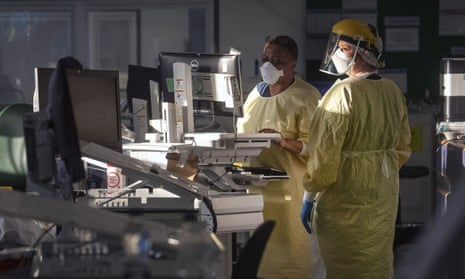Britain’s sickest children are being treated in intensive care units that are struggling with severe shortages of the specialist nurses needed to look after them, a report says.
The shortages in the UK’s 30 paediatric intensive care units (PICUs) are so severe that healthcare assistants are covering the work of nurses in an attempt to ensure that staffing levels are maintained.
Only one of the PICUs – at the James Cook University hospital in Middlesbrough – was found to have enough nurses to guarantee the standards of care expected. About 15,000 children and young people a year, often with life-threatening conditions, are cared for in PICUs.
Clinical standards that prevail in PICUs require them to ensure that seven nurses are on duty for each bed in a 24-hour cycle. However, the report by the Paediatric Intensive Care Audit Network (PICANet), a group of experts from Leicester and Leeds universities, found that 29 of the 30 had too few nurses to do that, and that all 30 had vacancies, sometimes large numbers of them.
“Parents will find this extremely alarming”, said Patricia Marquis, the Royal College of Nursing’s England director. “Most people wouldn’t believe that only one paediatric intensive care unit across the whole UK has enough staff to function properly, but this is the reality of the workforce crisis. Key roles in specialist nursing teams are lying vacant for years.”
The PICANet team identified nurses’ salaries and the cost of living in urban areas as key reasons. It found that three of the five hospitals with the lowest number of PICU nurses were in London: the Portland private hospital and Royal Brompton and Royal London NHS hospitals. Oxford’s John Radcliffe and Glasgow’s Royal Hospital for Sick Children were the others.
“The nursing shortage is crippling,” one paediatric intensive care doctor in London told the Guardian. “It means that we are routinely cancelling elective surgery that requires a PICU bed. Literally every single hospital in London with a PICU has had to do that recently.” The post-Brexit loss of PICU nurses from EU countries such as Spain and Portugal has exacerbated the situation.
A leaked NHS memo about three London hospitals shows that on 12 December there were just nine nurses on duty to look after 12 children in the PICU at King’s College hospital, seven to care for 11 young people at St George’s hospital, and 19 to look after 18 patients at Evelina children’s hospital. “Clearly [the nurse-to-patient staffing] ratio isn’t being provided, so yes, kids are getting substandard care.”
A second paediatric intensive care doctor said: “The shortage of PICU nurses is awful. Healthcare assistants can be very good. But their main strength is in soft skills stuff, like being a shoulder to cry on. But they can’t set up a renal haemodialysis machine or calibrate a ventilator for a child who is on oxygen, for example. Only a nurse can do that.
“Units try to stretch a smaller number of nurses to look after more patients. You try to deliver the same level of care with a lower number of staff, which is a patient safety issue,” he added.
Carli Whittaker, a nurse and the president-elect of the Paediatric Critical Care Society, said fewer PICUs were meeting staffing standards. Understaffing had led to an “erosion of morale” among PICU nurses and was affecting their emotional and psychological health, she added.
But she welcomed PICANet’s finding that despite the widespread nurse shortage, the quality of care children and young people receive in PICUs had not been affected.
The Department of Health and Social Care has been approached for comment.
